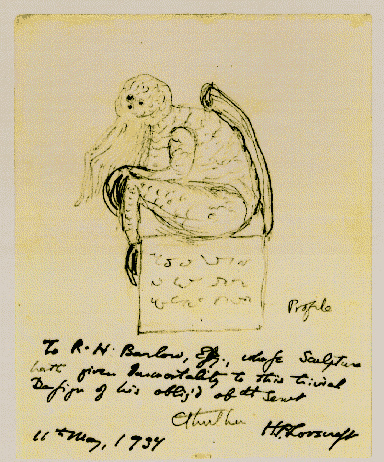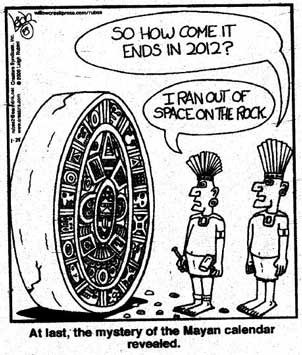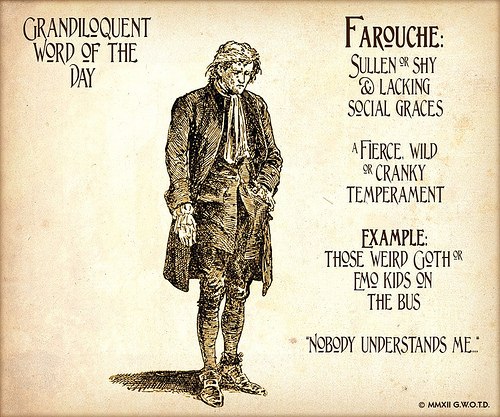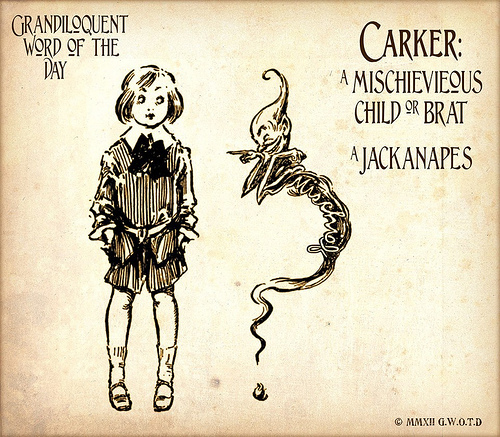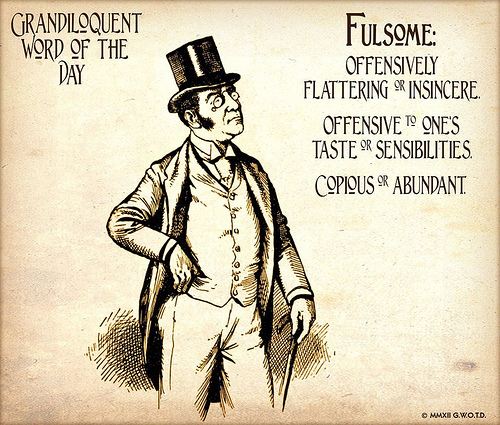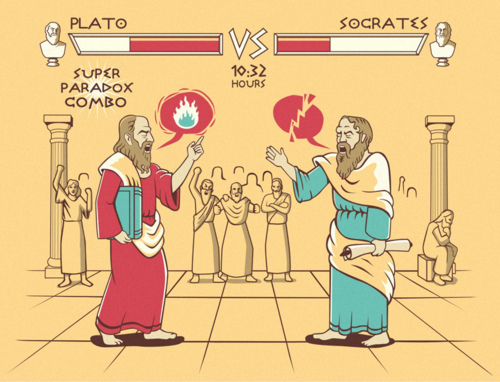Short & Sweet Treats discussion
Take a Coffee Break...
>
Word of the Day
message 251:
by
Ƹ̴Ӂ̴Ʒ Jenn Ƹ̴Ӂ̴Ʒ
(new)
Jan 03, 2014 01:18PM
 A wonderful quote!
A wonderful quote!
reply
|
flag
 Wonderful, Jen--Lovecraft inspired so many others who sensed that deep, dark quality under and behind "normal" life.
Wonderful, Jen--Lovecraft inspired so many others who sensed that deep, dark quality under and behind "normal" life.
 MUMPSIMUS
MUMPSIMUSPRONUNCIATION:
(MUMP-suh-muhs)
MEANING:
1. A view stubbornly held in spite of clear evidence that it's wrong.
2. A person who holds such a view.
ETYMOLOGY:
According to an old story, a priest used the nonsense word mumpsimus (instead of Latin sumpsimus) in the Mass. Even when told it was incorrect, he insisted that he had been saying it for 40 years and wouldn't change it. The expression is "quod in ore sumpsimus" ('which we have taken into the mouth'). Earliest documented use: 1530.
EXAMPLE: Refusing to accept Copernicus's ideas that the earth moves.
When Galileo supported Copernicus, the Church called him before the Inquisition, and in 1633 he was put under house arrest until his death in 1642. Finally, in 1992, three years after Galileo Galilei's namesake spacecraft had been launched on its way to Jupiter, the Vatican formally and publicly cleared Galileo of any wrongdoing.
http://en.wikipedia.org/wiki/Galileo_...
He was luckier than Giordano Bruno, who had been burned at the stake by the Inquisition in 1600 for similar views. "His writings are still on the Vatican’s list of forbidden texts." http://aastro.org/2010/02/giordano-br...
 Ah, Jen--you are fierce for sure, but never cranky! And I LOVE the Mayan calendar example for "mumpsimus" :-)
Ah, Jen--you are fierce for sure, but never cranky! And I LOVE the Mayan calendar example for "mumpsimus" :-)
 Ah, Julia, I try not to be online when I'm cranky that is the best time to catch up on TV or read myself out of a bad mood.
Ah, Julia, I try not to be online when I'm cranky that is the best time to catch up on TV or read myself out of a bad mood.
 MISOCAPNIST
MISOCAPNIST Etymology
miso- + stem of Ancient Greek καπνός (kapnos, “smoke”) + -ist
One who hates tobacco smoke. (DEFINITELY me!)

 yare
yarePRONUNCIATION:
(yahr or yayr)
MEANING:
adjective: 1. Easily maneuverable; nimble. 2. Ready; prepared.
ETYMOLOGY:
From Old English gearo/gearu (ready). Earliest documented use: 888.
USAGE:
"I do desire to learn, sir; and, I hope, if you have occasion to use me for your own turn, you shall find me yare."
William Shakespeare; Measure For Measure; 1604.
"She was a 'bonnie lass' in the words of her chief engineer; she was faithful, she was yare -- an unlikely compliment for a vessel without sails."
D.C. Riechel; German Departures; iUniverse; 2009.
 repletion
repletionPRONUNCIATION:
(ri-PLEE-shuhn)
MEANING:
noun: The condition of being completely filled or satisfied.
ETYMOLOGY:
Via French, from Latin replere, from re- (back, again) + plere (to fill), from plenus (full). Earliest documented use: 1398.
USAGE:
"Her body tingled with repletion and yet she was somehow unsatisfied."
Susan Swann; The Ritual of Pearls; Little, Brown; 1995.
 LUGUBRIOUS
LUGUBRIOUSlu̇-ˈgü-brē-əs
full of sadness or sorrow
ORIGIN
Latin lugubris, from lugēre to mourn; akin to Greek lygros mournful
First Known Use: 1585
EXAMPLE:
a comic actor known for his lugubrious manner

 Julia wrote: "LUGUBRIOUS
Julia wrote: "LUGUBRIOUSlu̇-ˈgü-brē-əs
full of sadness or sorrow
ORIGIN
Latin lugubris, from lugēre to mourn; akin to Greek lygros mournful
First Known Use: 1585
EXAMPLE:
a comic actor known for his lugubr..."
Perfect word for sad clowns!
 inimical
inimicalPRONUNCIATION:
(i-NIM-i-kuhl)
MEANING:
adjective: 1. Harmful. 2. Unfriendly.
ETYMOLOGY:
From Latin in- (not) + amicus (friend). A few other words that share the same root are: amigo, amity, enemy, amicable, and amicus curiae. Earliest documented use: 1645.
USAGE:
"But the landers found no other signs of biological activity, nor any organic compounds. If anything, the soil seemed inimical to life."
Burkhard Bilger; The Martian Chroniclers; The New Yorker; Apr 22, 2013.
 ignominy
ignominyPRONUNCIATION:
(IG-nuh-min-ee, ig-NOM-uh-nee)
MEANING:
noun: 1. Public disgrace. 2. Disgraceful quality or conduct.
ETYMOLOGY:
Via French, from Latin ignominia. Ultimately from the Indo-European root no-men- (name) which also gave us name, anonymous, noun, synonym, eponym, renown, nominate, misnomer, and moniker. Earliest documented use: 1540.
USAGE:
"Nor is JAL likely to suffer the ignominy of an immediate slump in the share price, as Facebook did after its IPO, analysts say."
From Bloated to Floated; The Economist (London, UK); Sep 15, 2012.
 MACABRE
MACABREshockingly repellent; inspiring horror
EXAMPLE:
“macabre tales of war and plague in the Middle ages”
This word first appeared in English in the context of the "Dance of Death," recounted in literature as the figure of Death leading people in a dance to the grave, and translated from the Old French Danse Macabre.
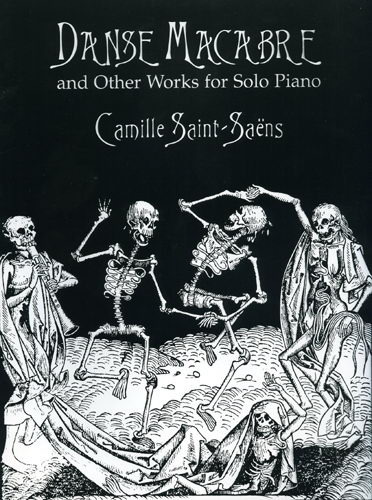
 MANUMIT
MANUMITto set free, to liberate.
EXAMPLE:
"Though he was an outspoken defender of liberty, George Washington did not manumit his own slaves until he was on his deathbed."
ORIGIN
Middle English manumitten, from Anglo-French manumettre, from Latin manumittere, from manus hand + mittere to let go, send
First Known Use: 15th century
 Week: Jan 13-17
Week: Jan 13-17It takes all kinds to make the world and it shows in this week's selection of words. For the next five days we'll see words to describe people of various persuasions. These are people you may meet at work or on a train, in a park or in the house next door -- almost anywhere on earth.
Here's a fun exercise for you: find at least one person epitomizing the day's word, every day this week. With some seven billion of us around there can't be any excuse for insufficient data.
http://wordsmith.org/words/today.html
 Jan 13:
Jan 13:voluble
PRONUNCIATION:
(VOL-yuh-buhl)
MEANING:
adjective: Speaking incessantly or fluently.
ETYMOLOGY:
Via French, from Latin volvere (to roll). Ultimately from the Indo-European root wel- (to turn or roll), which also gave us waltz, revolve, valley, walk, vault, volume, wallet, and helix. Earliest documented use: 1575.
USAGE:
"As Mr Barroso, a voluble sort, talked about strong transatlantic relationships and the like, Mr Obama gazed stony-faced at his shoes."
A Surfeit of Leaders; The Economist (London, UK); Apr 8, 2009.
 intransigent
intransigentPRONUNCIATION:
(in-TRAN-si-jent)
MEANING:
adjective: Unwilling to compromise, especially from an extreme position.
noun: One who refuses to compromise.
ETYMOLOGY:
Via Spanish/French, from Latin in- (not) + transigere (to settle). Ultimately from the Indo-European root ag- (to drive, draw), which is also the fount of such words as act, agent, agitate, litigate, synagogue, and ambassador. Earliest documented use: 1879.
USAGE:
"Both remain intransigent in their respective positions without any real effort to negotiate in a democratic spirit."
People Expect Democratic Practice from Two Top Parties; Financial Express (Bangladesh); Dec 26, 2013.
 potentate
potentatePRONUNCIATION:
(POH-ten-tayt)
MEANING:
noun: One having great power, especially an autocratic person.
ETYMOLOGY:
Via French, from Latin posse (to be able). Ultimately from the Indo-European root poti- (powerful, lord), which is also the source of power, potent, possess, pasha, compossible, impuissance, and puissant. Earliest documented use: 1475.
USAGE:
"The company has always been good at finding oil, whether by discovering new fields deep beneath the ocean floor or by schmoozing potentates such as Libya's Colonel Muammar Qaddafi."
Stanley Reed; Refilling BP's Tank; BusinessWeek (New York); Jul 22, 2007.
 This one is by the artist DugStanat, titled "The Grand Potentate": http://dugstanat.deviantart.com/art/T...
This one is by the artist DugStanat, titled "The Grand Potentate": http://dugstanat.deviantart.com/art/T...
 Julia wrote: "This one is by the artist DugStanat, titled "The Grand Potentate": http://dugstanat.deviantart.com/art/T...
Julia wrote: "This one is by the artist DugStanat, titled "The Grand Potentate": http://dugstanat.deviantart.com/art/T..."
Reminds me of Robert Mugabe.
 sophist
sophistPRONUNCIATION:
(SOF-ist)
MEANING:
noun: One who makes clever, but unsound arguments.
ETYMOLOGY:
From Latin sophista, from Greek sophistes (sage), from sophos (clever). Earliest documented use: 1542. In ancient Greece, Sophists were philosophers and teachers known for their subtle, but fallacious reasoning.
USAGE:
"But this day Mansoor had turned five, and Ma used a sophist's argument to call for a celebration."
M.G. Vassanji; The Assassin's Song; Doubleday; 2007.
 Hmm, have to say I disagree with using Plato and Socrates as examples of "sophist", since both of them opposed that school. The sophists charged money for teaching (which Socrates did not, and Plato was his disciple). Here's my picture :-)
Hmm, have to say I disagree with using Plato and Socrates as examples of "sophist", since both of them opposed that school. The sophists charged money for teaching (which Socrates did not, and Plato was his disciple). Here's my picture :-)
 LOL, nope, no danger of that. Whoever drew the cartoon was mocking Plato and Socrates, which we didn't do in the World Literature class. Plato's The Allegory of the Cave from Book VII of The Republic was my students' favorite--a wonderful, very short allegory about leading people into wisdom.
LOL, nope, no danger of that. Whoever drew the cartoon was mocking Plato and Socrates, which we didn't do in the World Literature class. Plato's The Allegory of the Cave from Book VII of The Republic was my students' favorite--a wonderful, very short allegory about leading people into wisdom.
 Yes, the students would draw their own picture of the "cave", and then I would have them write their OWN version of the allegory to show they understood the meaning. The best one was called "Allegory of the Television", where the "shadows" on the wall of Plato's cave become the TV images that people believed were the "truth".
Yes, the students would draw their own picture of the "cave", and then I would have them write their OWN version of the allegory to show they understood the meaning. The best one was called "Allegory of the Television", where the "shadows" on the wall of Plato's cave become the TV images that people believed were the "truth". 
 solicitous
solicitousPRONUNCIATION:
(suh-LIS-i-tuhs)
MEANING:
adjective:
1. Full of concern.
2. Eager.
3. Meticulous.
ETYMOLOGY:
From Latin sollus (whole). Ultimately from the Indo-European root sol- (whole), which brought us solid, salute, save, salvo, soldier, catholicity, salutary, and salubrious. Earliest documented use: 1563.
USAGE:
"The staff is solicitous of its core customer; efficient with others."
Alexandra Jacobs; Dennis Basso's New Shop; The New York Times; Dec 12, 2013.

 MALAPROPISM
MALAPROPISM an amusing error that occurs when a person mistakenly uses a word that sounds like another word but that has a very different meaning
Origin of MALAPROPISM
Mrs. Malaprop is a character noted for her misuse of words in R. B. Sheridan's comedy The Rivals(1775). The fictional Mrs. Malaprop, in Sheridan's play, utters many malapropisms. In Act III Scene 3, she declares to Captain Absolute, "Sure, if I reprehend any thing in this world it is the use of my oracular tongue, and a nice derangement of epitaphs!" This nonsensical utterance might, for example, be 'corrected' to, "If I apprehend anything in this world, it is the use of my vernacular tongue, and a nice arrangement of epithets."

 And here are some from Mrs. Malaprop herself, in The Rivals:
And here are some from Mrs. Malaprop herself, in The Rivals:“He is the very pineapple of politeness!” [pinnacle]
“I am sure I have done everything in my power since I exploded the affair.” [exposed]
“…promise to forget this fellow, to illiterate him, I say, quite from your memory.” [obliterate]
“…she’s as headstrong as an allegory on the banks of the Nile.” [alligator]
Here is the great Celia Imrie as Mrs. Malaprop:

Julia wrote: "LOL, yes we had fun with those in class :-)
"
Julia wrote: "LOL, yes we had fun with those in class :-)
"
haha! I just had to show that to my husband! so funny!
"
Julia wrote: "LOL, yes we had fun with those in class :-)
"
haha! I just had to show that to my husband! so funny!
Books mentioned in this topic
The Clicking of Cuthbert (other topics)The Crucible (other topics)
A History of Modern Drama, Volume I (other topics)
Toy Stories: Photos of Children from Around the World and Their Favorite Things (other topics)
The Book of Life (other topics)
More...
Authors mentioned in this topic
Leo Tolstoy (other topics)P.G. Wodehouse (other topics)
Leonardo da Vinci (other topics)
Theodore Roethke (other topics)
David Krasner (other topics)
More...


